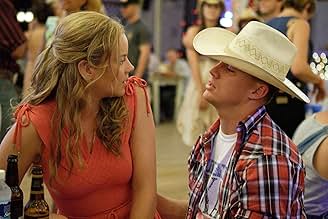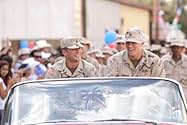A veteran soldier returns from his completed tour of duty in Iraq, only to find his life turned upside down when he is arbitrarily ordered to return to field duty by the Army.A veteran soldier returns from his completed tour of duty in Iraq, only to find his life turned upside down when he is arbitrarily ordered to return to field duty by the Army.A veteran soldier returns from his completed tour of duty in Iraq, only to find his life turned upside down when he is arbitrarily ordered to return to field duty by the Army.
- Director
- Writers
- Stars
- Awards
- 2 wins & 5 nominations total
Connett Brewer
- Curtis
- (as Connett M. Brewer)
- Director
- Writers
- All cast & crew
- Production, box office & more at IMDbPro
Featured reviews
Maybe the idea was to show the total hopelessness of the conflict--that it was not really a war but urban warfare, and that there is no way to win or to have a happy ending. But that's just an idea--it's not a movie.
I thought that the set-up was fine. But I am not sure the filmmakers knew where to go with it. Their take on the stop-loss policy is obvious, and it is a message that should be heard. But I think the film would have been more interesting if any character exhibited any real growth during the film. The vets were all depicted as basket cases--the most well-adjusted vet seemed to be the double-amputee--he told us why he would want to go back to Iraq and there was at least some productive purpose that would have been served by his return there.
Perhaps there are soldiers who don't mind being stop-lossed--who truly believe they are accomplishing something positive over there. It would have been refreshing to have a character like that--a non-basket case. It would have been good to hear arguments supporting the stop-loss program (if there are any).
The last 20-30 minutes of this film were baffling. The end of the film (not an ending, just an end) was very unsatisfying.
Ryan Philippe did a competent job, but rarely conveyed anything not apparent from the lines or situation. For example, you could see that a lot of his post-war angst was attributable to guilt. How that tied in with the ending is just a mystery to me.
I recall that a very similar military policy was explored by Joseph Heller in Catch-22. I think a comparison to that novel and film is more apt than comparing this to The Deer Hunter.
I wish this film could have been much better than it was.
I thought that the set-up was fine. But I am not sure the filmmakers knew where to go with it. Their take on the stop-loss policy is obvious, and it is a message that should be heard. But I think the film would have been more interesting if any character exhibited any real growth during the film. The vets were all depicted as basket cases--the most well-adjusted vet seemed to be the double-amputee--he told us why he would want to go back to Iraq and there was at least some productive purpose that would have been served by his return there.
Perhaps there are soldiers who don't mind being stop-lossed--who truly believe they are accomplishing something positive over there. It would have been refreshing to have a character like that--a non-basket case. It would have been good to hear arguments supporting the stop-loss program (if there are any).
The last 20-30 minutes of this film were baffling. The end of the film (not an ending, just an end) was very unsatisfying.
Ryan Philippe did a competent job, but rarely conveyed anything not apparent from the lines or situation. For example, you could see that a lot of his post-war angst was attributable to guilt. How that tied in with the ending is just a mystery to me.
I recall that a very similar military policy was explored by Joseph Heller in Catch-22. I think a comparison to that novel and film is more apt than comparing this to The Deer Hunter.
I wish this film could have been much better than it was.
Well intentioned, this film tells the fictional story of Brandon King (Ryan Phillippe), an American soldier who, after successfully completing a heroic but horrendous tour of duty in Iraq, is notified that, despite his wishes, he must return to Iraq for yet more combat duty, a real-life contingency called "stop-loss". It's a fate that neither King, nor real-life soldiers, want or deserve, but which the U.S. government justifies in lieu of a wartime draft.
The film's first few minutes provide a montage of images and scenes showing King, and his men, in Iraq, as they bond together as protective buddies, and as they endure a violent urban ambush, during which several buddies get killed or seriously wounded.
Back home in Texas, King and a couple of his men briefly celebrate their hero status. But life for them quickly deteriorates, as their wartime trauma leaves both physical and mental scars. And then, King gets his "stop-loss" notice. This sets up the rest of the film's plot.
The theme here is obvious. The brave soldier, having endured more than enough danger and trauma, is still just a powerless individual. As such, he or she is caught between having to resubmit to the horrors of war, or submit to a perilous and life-altering AWOL status in the U.S., or elsewhere, forever on the run from an overpowering American political system. It's a timely and worthy subject for a film.
That much effort and care went into the creation of the film, from background research to attention to detail in costumes, production design, and military protocol is obvious.
And the film's color cinematography also is quite good. There are lots of close-ups, to get a feel for what the characters are going through. Many scenes feature natural lighting, used in clever ways. At times, the film has an almost documentary look and feel. Acting is overall credible. I especially liked the performances of Linda Emond, as King's mom, and Abbie Cornish, as a young woman who tries to help King.
The major problem is the script. Characters are rather stereotyped and two-dimensional. The plot is fairly predictable. And the story and its attendant theme are a tad too direct. I could have wished for a little more depth, and a plot twist or two. The film's ending is not very satisfying.
Yet, "Stop-Loss" is a noble effort to document the brutality not only of war but also of an American government that uses, then basically throws away, people, to ensure the preservation of an American war industry and continued power of faceless bureaucrats and corrupt politicians.
The film's first few minutes provide a montage of images and scenes showing King, and his men, in Iraq, as they bond together as protective buddies, and as they endure a violent urban ambush, during which several buddies get killed or seriously wounded.
Back home in Texas, King and a couple of his men briefly celebrate their hero status. But life for them quickly deteriorates, as their wartime trauma leaves both physical and mental scars. And then, King gets his "stop-loss" notice. This sets up the rest of the film's plot.
The theme here is obvious. The brave soldier, having endured more than enough danger and trauma, is still just a powerless individual. As such, he or she is caught between having to resubmit to the horrors of war, or submit to a perilous and life-altering AWOL status in the U.S., or elsewhere, forever on the run from an overpowering American political system. It's a timely and worthy subject for a film.
That much effort and care went into the creation of the film, from background research to attention to detail in costumes, production design, and military protocol is obvious.
And the film's color cinematography also is quite good. There are lots of close-ups, to get a feel for what the characters are going through. Many scenes feature natural lighting, used in clever ways. At times, the film has an almost documentary look and feel. Acting is overall credible. I especially liked the performances of Linda Emond, as King's mom, and Abbie Cornish, as a young woman who tries to help King.
The major problem is the script. Characters are rather stereotyped and two-dimensional. The plot is fairly predictable. And the story and its attendant theme are a tad too direct. I could have wished for a little more depth, and a plot twist or two. The film's ending is not very satisfying.
Yet, "Stop-Loss" is a noble effort to document the brutality not only of war but also of an American government that uses, then basically throws away, people, to ensure the preservation of an American war industry and continued power of faceless bureaucrats and corrupt politicians.
Kimberly Peirce becomes one of the latest directors to try and only marginally succeed in making a compelling film about the Iraq conflict.
Peirce takes on as her subject the military's stop-loss clause, essentially a back door draft by which the military can use fine print in recruits' contracts to prevent them from getting out once their time is up. Peirce obviously feels strongly about the policy, but what should be a hard-hitting drama feels instead like a rather preachy after-school special. She coaxes a nice performance out of Ryan Phillipe, as the soldier who goes AWOL when his stop-loss clause is activated, but she doesn't fare as well with the rest of the cast. The film suffers from confusing editing, that doesn't always make it clear where characters are or how events are related to one another, and the writing at times is weak as well, with character motivations not coming across as clearly as they should.
I don't know what it is about the Iraq conflict that makes it so hard for filmmakers to make good movies about it. Maybe it will have to be over for a while before anyone can begin to approach it with any success.
Grade: B-
Peirce takes on as her subject the military's stop-loss clause, essentially a back door draft by which the military can use fine print in recruits' contracts to prevent them from getting out once their time is up. Peirce obviously feels strongly about the policy, but what should be a hard-hitting drama feels instead like a rather preachy after-school special. She coaxes a nice performance out of Ryan Phillipe, as the soldier who goes AWOL when his stop-loss clause is activated, but she doesn't fare as well with the rest of the cast. The film suffers from confusing editing, that doesn't always make it clear where characters are or how events are related to one another, and the writing at times is weak as well, with character motivations not coming across as clearly as they should.
I don't know what it is about the Iraq conflict that makes it so hard for filmmakers to make good movies about it. Maybe it will have to be over for a while before anyone can begin to approach it with any success.
Grade: B-
Director Kimberly Peirce ("Boys Don't Cry") brings another powerfully charged film of such raw emotion that upon later reflection of the movie I felt like I had witnessed real events.
Stop-Loss follows the fictional story of a soldier, Brandon King (Ryan Philippe), who has returned home after a tour in Iraq. His contract is up and he just about to get out when he is stop-lossed (a "fine-print" section in all soldiers' contracts that gives the President the power to extended soldier's contracts in time of war). He refuses to be shipped back to Iraq, and goes AWOL in search of his state's senator for help. What follows is his road trip to fight the stop-loss as well as showing the devastating affects his fellow soldiers (Channing Tatum, Joseph Gordon-Levitt) experience from the horrible war. Its' acting, directing, and writing had such a feeling of authenticity, and combined with the fact that 81,000 of our brave soldiers have already been stop-lossed since Spetember 11,2001, this film feels like a true story.
One thing that made this film succeed so well was it's director was a woman, and she was able to make a movie were you could feel and see the emotions these guys were feeling even as they would desperately try and mask them.
The acting was extraordinary from the three main soldiers, most notably Ryan Philippe who is so gritty and real in his performance that he seems like he actually is a marine. Channing Tatum gives a genuine performance, but Joseph Gordon-Levitt's is the most haunting of the trio as a soldier who fights his Post Traumatic Stress Disorder with excessive amounts of booze and slowly slips into a deep hole of despair.
This films is not a propaganda piece, it simply portrays something that is going on right now. It brings up many good points, but never bashes you with a certain viewpoint but leaves it to you to decide. This is such emotionally powerful, deeply moving film, the best film I have seen since the year started, and destined to be one of my favorites from this year.
Stop-Loss follows the fictional story of a soldier, Brandon King (Ryan Philippe), who has returned home after a tour in Iraq. His contract is up and he just about to get out when he is stop-lossed (a "fine-print" section in all soldiers' contracts that gives the President the power to extended soldier's contracts in time of war). He refuses to be shipped back to Iraq, and goes AWOL in search of his state's senator for help. What follows is his road trip to fight the stop-loss as well as showing the devastating affects his fellow soldiers (Channing Tatum, Joseph Gordon-Levitt) experience from the horrible war. Its' acting, directing, and writing had such a feeling of authenticity, and combined with the fact that 81,000 of our brave soldiers have already been stop-lossed since Spetember 11,2001, this film feels like a true story.
One thing that made this film succeed so well was it's director was a woman, and she was able to make a movie were you could feel and see the emotions these guys were feeling even as they would desperately try and mask them.
The acting was extraordinary from the three main soldiers, most notably Ryan Philippe who is so gritty and real in his performance that he seems like he actually is a marine. Channing Tatum gives a genuine performance, but Joseph Gordon-Levitt's is the most haunting of the trio as a soldier who fights his Post Traumatic Stress Disorder with excessive amounts of booze and slowly slips into a deep hole of despair.
This films is not a propaganda piece, it simply portrays something that is going on right now. It brings up many good points, but never bashes you with a certain viewpoint but leaves it to you to decide. This is such emotionally powerful, deeply moving film, the best film I have seen since the year started, and destined to be one of my favorites from this year.
Stop-Loss (2008)
**** (out of 4)
Hard hitting, Anti-Iraq film has Ryan Phillippe playing a U.S. soldier who leaves his final mission in Iraq but soon learns he's been stop-lossed, which means the government can break your original contract and send you back to Iraq. Phillippe refuses to go back so he goes AWOL and hits the road with his best friend's girl (Abbie Cornish) while trying to figure out what to do. Over the past few years there have been countless films protesting the Iraq war and all of them have been fair (Lions for Lambs) to really poor (Redacted) but this one here is clearly the best of the bunch but it's also one of the best war movies out there and clearly one of the best of 2008. The movie has a strong stance against the war but it's certainly Pro-Soldier and the film bleeds with love for the young men putting their lives on the line each day. The film opens with a scene in Iraq where the soldiers are working a checkpoint when a group of thugs show up with guns a soon a big battle breaks out and leads to tragedy. I really enjoyed what director Peirce did here by instead of focusing on the violence she clearly wants the viewer to see that these are kids doing this fighting. She makes it clear to us that it's kids doing the shooting and being shot at, which is something people and the media seems to forget. The Anti-Iraq stuff is handled very well and never becomes too preachy unlike many other recent films. I think the film's one problem is that it really should have ran at least an hour longer because the movie not only looks at Phillippe's situation but also two of his friends who are dealing with their own battles on returning home. The film is a lot like The Deer Hunter, a film that took three hours to tell its story, and I think that long running time would have worked well here. The two friends play a major part in the story and an emotional one so I think their stories could have been pushed out a bit further. The performances in the film are all rather remarkable and this is certainly the greatest work I've seen from Phillippe. I don't want to ruin anything but he has to go through all sorts of mental pain in the film and he pulls this off wonderfully well. I think Phillippe has always been a good actor but this film here pushes him to a great one. He really does give a strong, raw and highly emotional performance, which is the heart of the film. Cornish is also very good in her role as is Channing Tatum as the best friend. No matter where you stand on the actual war, that shouldn't keep you away from this film, which is quite original in how it tells its story and most importantly it does pay tribute to these kids who lost their lives on the battle field. This is a very strong and highly emotional film that pushes all the right buttons and really delivers.
**** (out of 4)
Hard hitting, Anti-Iraq film has Ryan Phillippe playing a U.S. soldier who leaves his final mission in Iraq but soon learns he's been stop-lossed, which means the government can break your original contract and send you back to Iraq. Phillippe refuses to go back so he goes AWOL and hits the road with his best friend's girl (Abbie Cornish) while trying to figure out what to do. Over the past few years there have been countless films protesting the Iraq war and all of them have been fair (Lions for Lambs) to really poor (Redacted) but this one here is clearly the best of the bunch but it's also one of the best war movies out there and clearly one of the best of 2008. The movie has a strong stance against the war but it's certainly Pro-Soldier and the film bleeds with love for the young men putting their lives on the line each day. The film opens with a scene in Iraq where the soldiers are working a checkpoint when a group of thugs show up with guns a soon a big battle breaks out and leads to tragedy. I really enjoyed what director Peirce did here by instead of focusing on the violence she clearly wants the viewer to see that these are kids doing this fighting. She makes it clear to us that it's kids doing the shooting and being shot at, which is something people and the media seems to forget. The Anti-Iraq stuff is handled very well and never becomes too preachy unlike many other recent films. I think the film's one problem is that it really should have ran at least an hour longer because the movie not only looks at Phillippe's situation but also two of his friends who are dealing with their own battles on returning home. The film is a lot like The Deer Hunter, a film that took three hours to tell its story, and I think that long running time would have worked well here. The two friends play a major part in the story and an emotional one so I think their stories could have been pushed out a bit further. The performances in the film are all rather remarkable and this is certainly the greatest work I've seen from Phillippe. I don't want to ruin anything but he has to go through all sorts of mental pain in the film and he pulls this off wonderfully well. I think Phillippe has always been a good actor but this film here pushes him to a great one. He really does give a strong, raw and highly emotional performance, which is the heart of the film. Cornish is also very good in her role as is Channing Tatum as the best friend. No matter where you stand on the actual war, that shouldn't keep you away from this film, which is quite original in how it tells its story and most importantly it does pay tribute to these kids who lost their lives on the battle field. This is a very strong and highly emotional film that pushes all the right buttons and really delivers.
Did you know
- TriviaThe title refers to a provision in all military service contracts that says a service member can be involuntarily extended beyond their discharge (from active duty) date, and at times beyond their final discharge from service date, according to the needs of the service.
- GoofsWhen Sgt. King visits Rico, as he pushes his wheel chair out of the sun you can clearly see a bulge in Rico's t-shirt where his real arm is resting.
- Quotes
Brandon King: Who wants to play lets start shootin' people?
- SoundtracksCourtesy of the Red, White and Blue (The Angry American)
Written by Toby Keith
Details
Box office
- Budget
- $25,000,000 (estimated)
- Gross US & Canada
- $10,915,744
- Opening weekend US & Canada
- $4,555,117
- Mar 30, 2008
- Gross worldwide
- $11,212,953
- Runtime1 hour 52 minutes
- Color
- Sound mix
- Aspect ratio
- 1.85 : 1
Contribute to this page
Suggest an edit or add missing content





































